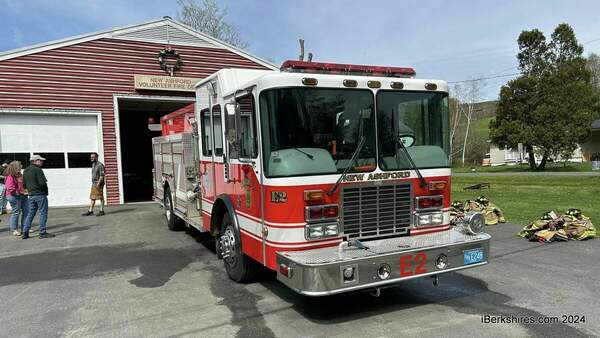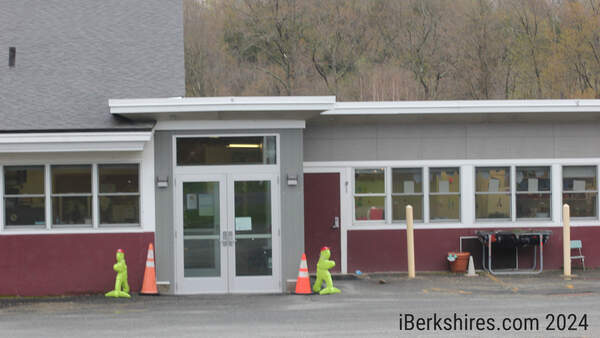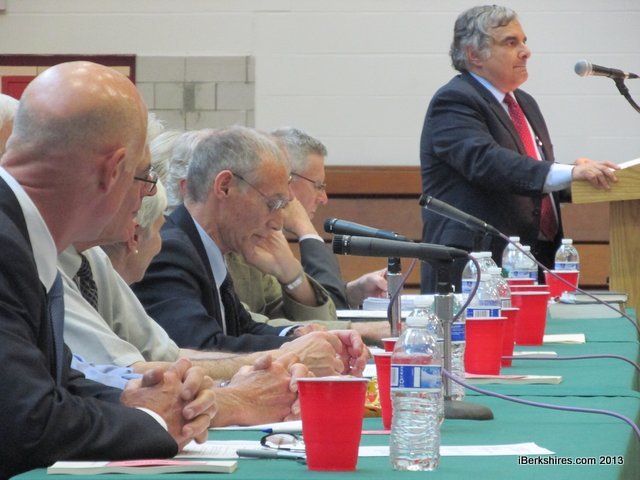
Williamstown Declines Civil Fingerprinting, Spruces Plan
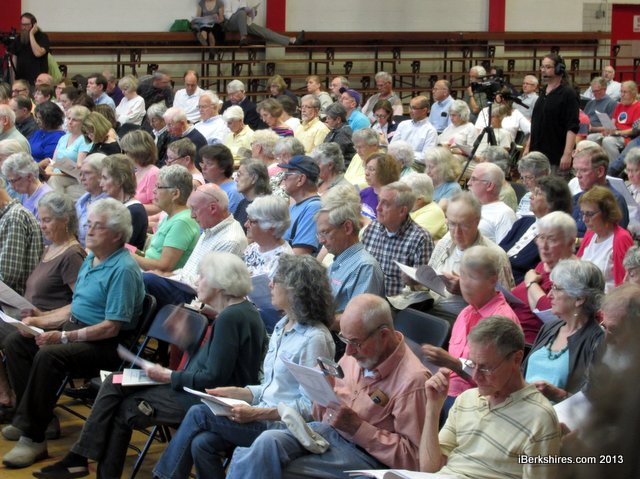 Barely 6 percent of the town's voters attended Tuesday's annual town meeting, passing most of the articles with little or no discussion. Barely 6 percent of the town's voters attended Tuesday's annual town meeting, passing most of the articles with little or no discussion. |
WILLIAMSTOWN, Mass. — Town meeting on Tuesday night tabled a proposal to institute a civil fingerprinting program and rejected a plan that would have appropriated $365,000 in town funds to help a residents cooperative buy the Spruces Mobile Home Park.
Most of the 38 articles on the annual town meeting warrant passed with little to no comment in a meeting that took just about 1 hour, 45 minutes under the direction of Town Moderator Mark Gold, serving his last town meeting in that capacity.
The voters decided once again to take no action on the two articles with the greatest potential for discussion — both repeats of articles on last month's special town meeting warrant.
An article seeking to accept a provision of Massachusetts General Law allowing simple majority votes on transfers of town land for the purposes of developing affordable housing and a proposal that the town transfer 10 acres of the so-called Lowry property for that purpose both were set aside by the voters, who followed the recommendations of the Board of Selectmen and the Conservation Commission to do so.
However, the voters chose not to follow the recommendation of the Selectmen on Article 29, which sought to take advantage of a new state law allowing municipalities to run fingerprint-based criminal checks on applicants for certain occupational licenses.
Had the town adopted the provision, it could have begun fingerprinting applicants for licenses ranging from solicitors and peddlers to ice cream truck/food vendors.
But several residents rose to say the civil fingerprinting provision was either overly broad, not necessary or ineffective.
"I hope we haven't come to the point in Williamstown where this is necessary," Bill Densmore said from the floor of the meeting.
Janean Laidlaw said the background checks could provide a false sense of security.
"I'm not sure this action will have the intended effect you desire," Laidlaw said. "These fingerprint checks won't catch all the 'bad guys.' ... They may be very slick fraudsters.
"[The checks] could leave citizens with the false impression that someone who was actually up to no good was OK."
Several residents questioned whether the new law would inhibit free speech by requiring political canvassers to undergo fingerprint tests. Town Counsel Joel Bard and Town Manager Peter Fohlin clarified that the law addresses a specific list of individuals engaged in commerce who currently are licensed by the town and would not effect people who were, for example, seeking names on a political petition or religious evangelists.
"Rather than say [the proposal] is Draconian, I would say it's regrettable," Fohlin said. "As a sign of the times, apparently, this is necessary and certainly the Massachusetts Legislature decided it was necessary.
"When a person knocks on your door at 9 o'clock at night and you call the police and ask if this person is legitimate, we would like to be able to give you a good faith answer."
In the end, the town voted by a two-thirds voice vote to table the article.
By a resounding majority voice vote, voters rejected a citizen's petition that would have allocated taxpayer money to a yet-to-be-formed residents cooperative to purchase the Spruces Mobile Home Park, which was devestated by Tropical Storm Irene two years ago and which will be closed if, as expected, the town accepts possession under an agreement with park owner Morgan Management.
Former Selectman Kenneth Swiatek, who introduced the article, explained that he drafted the proposal after talking with Spruces residents who felt disenfranchised by the town's plan acquire and close the park using funds from a federal Hazard Mitigation Grant.
Swiatek argued that the Spruces location is better suited to current residents and that affordable housing could be created on the site more cheaply than it could be built elsewhere — even after the cost of flood-prevention measures are taken into account.
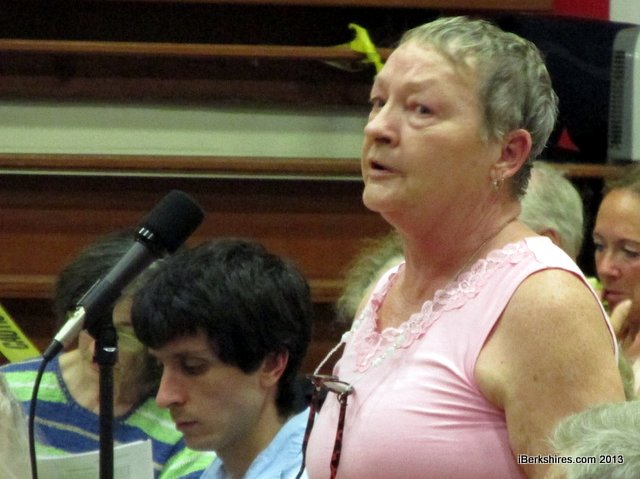 Spruces resident Tremus Thompson appeals to town meeting to reject a proposal to help tenants buy the park; Jane Patton and Ron Turbin, elected in April, are sworn onto the Board of Selectmen. Spruces resident Tremus Thompson appeals to town meeting to reject a proposal to help tenants buy the park; Jane Patton and Ron Turbin, elected in April, are sworn onto the Board of Selectmen. |
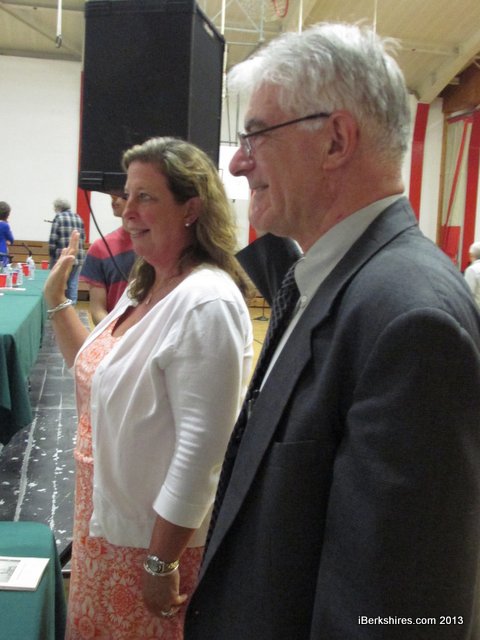 |
Swiatek and several other abutters to the Lowry property have been outspoken critics of proposals to develop the site since it was mentioned as an alternative at a November 2012 Selectmen's meeting.
Three current Spruces residents spoke from the floor to oppose Swiatek's proposal. Another stepped to the microphone to support it.
"The majority [of residents] do not want to buy into a cooperative," said Cynthia Clermont-Rebello, the president of the Spruces' Tenants Association. "They do not want to sign a half-million dollar mortgage. They do not want to remain in harm's way."
Lucy Sherrill, vice president of a group called Save the Spruces, said it is not clear what the majority of residents want and called for a "comprehensive study of the whole situation."
Spruces residents Loretta Martin and Tremus Thompson made emotional appeals to move forward with alternative housing sites and let park residents move on with their lives.
"I absolutely will not take money from the town to help us save the Spruces, and I will not take it from the children," said Thompson, alluding to language in Swiatek's petition that suggested his plan could be funded by money that otherwise would go to the Williamstown Youth Center.
Martin agreed.
"Last year, I was scared to death when we had these evacuation meetings," Martin said. "And you saw ('Superstorm') Sandy. It was like something from a science fiction movie."
In addition to dealing with the three citizens' petitions on the warrant, voters dispensed with the regular business of the annual town meeting, including approval of the $6.7 million general town budget for fiscal 2014, an increase of 2.4 percent from FY13.
The town also approved with little discussion several changes to its zoning bylaws, including one creating a new designation for a stretch of Cold Spring Road. Until Tuesday night, properties in the new district, called the Southern Gateway District, were either Rural Residence 3 or Tourist Business. The new designation simplifies the zoning while preserving current protections against overdevelopment, Planning Board member Chris Winters said.
The annual town meeting was attended by 283 of the town's 4,600 registered voters, or about 6 percent. More than double that had attended last month's town meetings.
In addition to dealing with the town's business, attendees also learned that Affordable Housing Committee Chairwoman Catherine Yamamoto is this year's recipient of the Faith Scarborough Community Service Award and Council on Aging van driver Kathy Vareschi is the town's Employee of the Year.
Tags: Spruces, town meeting 2013,

